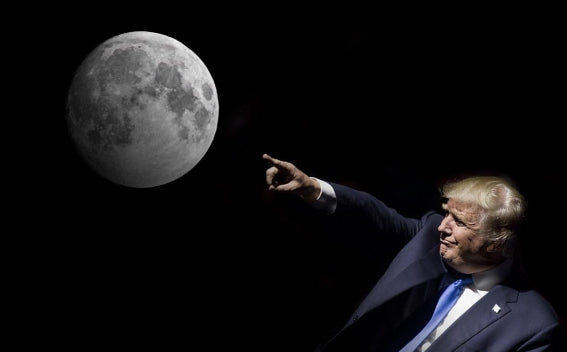
Trump Signs Executive Order To Mine Our Moon.
Share
President Trump has put forth a signed executive order this past week creating the opportunity for Americans to mine resources in outer space, including our moon and other celestial bodies such as Mars.
The executive order - named "Encouraging International Support for the Recovery and Use of Space Resources" pays special mind to justify its reasoning stating "... the United States does not view space as a global commons," and beelines the prerogative of commercial engagement in exploration, recovery, and utilisation of resources found in outer space.
Theorists estimate the bounty of resources adjacent to our planet including the Moon and asteroids are in the trillions of $USD.
This includes, but is not limited to, water and certain precious minerals found on the moon and other celestial bodies.

"Surely there are laws about this type of stuff?" you ask.
The US never signed the 1979 Moon Agreement - a multilateral treaty that turns jurisdiction of all celestial bodies over to the participant countries. Meaning all activities would conform to international law particularly that the moon and said celestial bodies are to be used peaceably and their environments left unspoiled.
The new order signed by President Trump ostensibly states that the Moon agreement is not an "effective or necessary instrument to guide nation-states", which is coming off the back of the United State's 2015 congressional Commercial Space Launch Competitiveness Act allowing private citizens and industries to "engage in commercial exploration and exploitation of space resources" and continues with "Americans should have the right to engage in commercial exploration, recovery and use of resources in outer space, consistent with applicable law."
Translated, the act means that the U.S. grants its citizens explicit allowance to anyone to mine, sell and own any space material. This also means the President does not respect the unsigned 1979 Moon Agreement and does not consider it an applicable law.
Russian space agency deputy general director for international cooperation slammed Trump by comparing the executive order to that of colonialism saying it: "... hardly sets the countries to fruitful cooperation. There have already been examples in history when one country decided to start seizing territories in its interest - everyone remembers what came of it."
The eagerness of the U.S. to gather natural resources is nothing new, as the current POTUS' administrational policies on Earth continue to allow the opening of land for mining while dialling back environmental and climate change regulations in favour of their substantial coal industry. This includes the continual avoidance of updating the laws surrounding hard rock mining as Earth continues to subdue to the ill effects of climate change. To date, the outdated and damaging law has remained spotless since its creation in 1872.

Government officials have been directed to encourage international support for the order thus the name "Encouraging International Support for the Recovery and Use of Space Resources".
The more nations that support the U.S. and benefit from the executive order will effectively create a situation in which they are supporting the United States' intentions of creating a new economic boon and defy the longstanding treaties that have governed future of peace in space.
The order states that any and all commercial partners are privy to an "innovative and sustainable" program headed by the United States to "lead the return of humans to the Moon for long-term exploration and utilisation, followed by human missions to Mars and other destinations."
European interests have since emerged and plan to begin extracting resources as early as 2025 while China and India have since flirted with the idea of extracting natural gases from the moon.
The United States will share any resources with commercial partners under their wing and allow the use of their lunar gateway to Mars when the Project Artemis finally comes to fruition.
The Artemis program is centred around the creation of a waystation that will serve as a lunar gas station of sorts to the United States and its beneficiaries, as the highway to Mars opens up sometime within the next several years.
Scientific staff aligned with the President attest that "scientists and researchers are investing a lot of time and resources in ways astronauts will be able to gather what's around them on the moon or Mars in order to make building materials, life-sustaining shelter, and even renewable fuel for people staying on these celestial bodies."
It's hard not to be concerned, however, given the track record of the current administration and its sheer negligence in the face of global environmental science and longstanding treaties, its hard to remain optimistic about the use of our Moon in the future.
What do you think?
#Space_Aus




